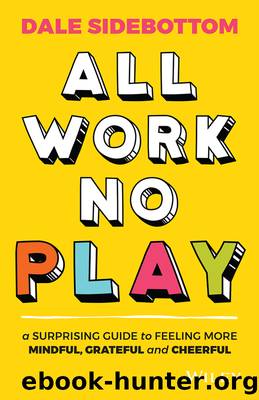All Work No Play by Dale Sidebottom

Author:Dale Sidebottom [Sidebottom, Dale]
Language: eng
Format: epub
ISBN: 9780730391630
Publisher: Wiley
Published: 2021-04-14T00:00:00+00:00
We would all love to have a Sato-san in our lives every day. Someone to tell us, âYou've got this!â when we think we haven't. But, as we've seen, there are ways we can shift our mindset by including play in our daily activitiesâââand it's something we can easily achieve without anyone else's encouragement.
Boosting our mood
Play can be a brilliant way to instantly enhance your mood either momentarily or more consistently, if you ritualise it in your daily routine.
One thing I notice when I speak to large workplaces full of stressed-out employees, or in schools, is that the keynotes always tend to schedule me at the end of the day when everyone's tired, worn out and not in the mood. The last thing they want to see is me rock up with a smile on my face and a lot of energyâââworst of all, expecting them to be in the same mindset as I am.
I couldn't count the number of times CEOs, directors, principals and coaches have gone out of their way in the lead-up to sessions to tell me that they don't like team building and hate icebreakers. And I totally get this. I'm sure we have all had a bad experience with âicebreakersâ (myself included), where we're forced to stand in a circle and everyone has to take it in turn to say their name and share something about themselves. I call these types of activities âice makersâ because they tend to make everyone nervous and self-conscious.
Instead of people listening and learning about their peers, activities like these make them focus inwards, to think solely about what they're going to say. It's only when their turn is over that they feel some kind of reprieve and become more present in the moment. These activities are quite uninventive and often plain awkward.
I believe a good icebreaker or team-building game is one that doesn't shine the light on just one person.
People need to feel safe and confident they can express themselves freely without being judged. So, I believe a good icebreaker or team-building game is one where everyone is able to fully engage in what it is they are doing, without feeling worried about what those around them are thinking. Instead of calling these group activities âicebreakersâ or âteam-building exercisesâ I call them âconnection startersâ. In part IV of the book I share instructions on how to play four of the connection starters I use with groups and individuals. They are âOne, Two, Threeâ, âThree Is a Charmâ, âClapping: 1, 2, 3â and âDrawing Animals on Your Headâ.
In the first 20 minutes of starting a workshop, I usually play three or four âconnection startersâ with the room, and instantly the atmosphere feels more positive.
We've seen in previous chapters that play-based activities can also serve to help people be more âin the momentâ and worry less about the stressful, high-pressure situations they get caught up in on a daily basis. They also create a space and environment where being vulnerable, curious and innovative are encouraged and promoted by all.
Download
This site does not store any files on its server. We only index and link to content provided by other sites. Please contact the content providers to delete copyright contents if any and email us, we'll remove relevant links or contents immediately.
Professional Troublemaker by Luvvie Ajayi Jones(29643)
Whiskey Words & a Shovel I by r.h. Sin(19374)
Rewire Your Anxious Brain by Catherine M. Pittman(18625)
Healthy Aging For Dummies by Brent Agin & Sharon Perkins RN(17031)
Cat's cradle by Kurt Vonnegut(15310)
Talking to Strangers by Malcolm Gladwell(13334)
The Art of Thinking Clearly by Rolf Dobelli(10396)
They Both Die at the End by Adam Silvera(9793)
The 5 Love Languages: The Secret to Love That Lasts by Gary Chapman(9762)
Doing It: Let's Talk About Sex... by Hannah Witton(9267)
The Compound Effect by Darren Hardy(8909)
Thirteen Reasons Why by Jay Asher(8874)
Goodbye, Things by Fumio Sasaki(8565)
Wonder by R.J. Palacio(8558)
Tools of Titans by Timothy Ferriss(8351)
Atomic Habits: Tiny Changes, Remarkable Results by James Clear(8311)
Becoming Supernatural by Dr. Joe Dispenza(8188)
Wonder by R. J. Palacio(8090)
Change Your Questions, Change Your Life by Marilee Adams(7721)
